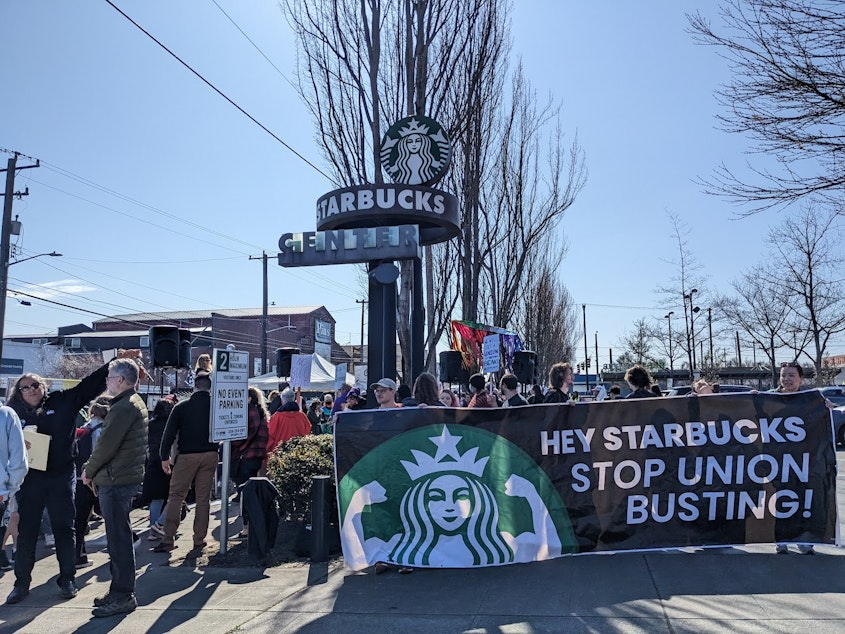Starbucks and union face off in Seattle over negotiation rules

Starbucks and the union representing hundreds of its stores faced off at a historic hearing in Seattle on Tuesday.
The National Labor Relations Board and Starbucks Workers United are seeking a federal order forcing Starbucks to the bargaining table. But Starbucks says it’s been there the whole time, waiting to negotiate in good faith.
Both sides blame each other for stalling bargaining over a flashpoint many workers are familiar with: a hybrid meeting model that allows some organizers to join by Zoom.
Starbucks is demanding that negotiations happen in-person, while the union says pandemic-era rules allowing for hybrid bargaining should still apply.
“It shouldn't take a year and a half to get to the table just because they don't like the way that we've all decided that we want to bargain with the company,” said Elizabeth Duran, a Starbucks employee and union organizer, outside the hearing. “That shouldn't be something that they can just decide, unilaterally saying, 'No, we won't do it.’”
More than 340 Starbucks stores have voted to unionize in the fast few years, despite what organizers describe as a “scorched earth” anti-union campaign from the company. The NLRB has found Starbucks in violation of labor law dozens of times since the organizing campaign began.
Sponsored
In the judicial process that kicked off Tuesday, a federal administrative judge is tasked with deciding whether Starbucks or the union illegally blocked negotiations from moving forward over disagreements about hybrid meetings.
“While we believe the connection and direct relationship we have as partners is core to our culture and craft, Starbucks has approached bargaining with consistency and a sincere desire to progress negotiations for partners at every single store represented by a union," said Starbucks' senior vice president of partner resources, May Jensen, in a statement.
The union hopes the judge will recommend a federal order requiring Starbucks to negotiate under terms originally set during the pandemic. At that time, the parties agreed to hybrid negotiating model because public health offices recommended doing so.
Also at issue is whether Starbucks should negotiate with stores on an individual basis or collectively. The union wants to reach an agreement with Starbucks on a set of over-arching proposals that would affect all stores, then allow individual locations to negotiate their specific concerns. Starbucks says it initially sought a national or regional negotiating approach but shifted to store-by-store bargaining at the union’s behest.
The hearings are expected to last several weeks or months. When they conclude, the judge overseeing proceedings will make a recommendation to a panel of federal administrative judges.
Sponsored
“My biggest hope is that we set new precedent,” Duran said, "so that no other worker has to go through a year and a half of waiting to get to a single bargaining table to discuss a single line on a single proposal, the way that we have.”




